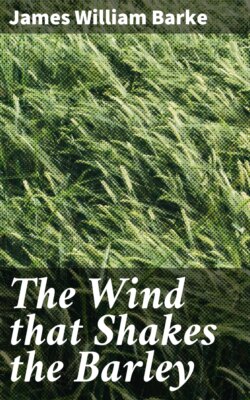Читать книгу The Wind that Shakes the Barley - James William Barke - Страница 17
На сайте Литреса книга снята с продажи.
COMPASSION
ОглавлениеTable of Contents
John Tennant had moved from Laigh Corton into the parish of Ochiltree—nearer Machlin than the town of Ayr.
Their friendship was sadly missed at Mount Oliphant. Robin missed the company of the Tennant boys—especially during the long summer nights when the crops were ripening and there was little to do in the evenings apart from herding the cattle beasts—a task that could well be left to Nancy and Willie.
It was during the summer evenings Gilbert and he would go walking across the rising hill ground, explore the banks of the Doon or maybe loiter for an hour at the smiddy of John Tennant in Alloway and hear the crack of the older men.
The Alloway smith was something of a reader (it was he who had first given Robin the chaps of Blind Harry’s Wallace to read); and he had a soft side to the sons of William Burns. It worried him to see Robin looking so poorly.
“What in God’s name’s cam’ ower you, Robin?” he said to him one night. “Are you no’ getting your bite up at the Mount? To hell, laddie, you’ll need to be guid to yoursel’ or you’ll never mak’ a pleughman.”
Seeing how Robin blushed, seeing how his great eyes filmed with pain, the smith felt he could have bitten out his tongue.
He put his hand on his stooping shoulder and he grued to feel how the bones were sharp beneath the hoddin grey and the skin.
“I didna mean to hurt you, laddie. I ken fine how things are wi’ your faither. Aye: it’s a sair fecht trying to grub a living out o’ a bog like the Mount; but that’s a grand drying win’ that’s shaking the barley... Aye: I think we’ll hae a guid hairst the year. We’ve never died a winter yet, Robin; and I hae nae doubt that you’ll prosper gin the hairst were by.”
Robin slunk away in an agony of shame. Had the smith spoken harshly he could have retaliated; but he had spoken with kindness and from the depths of a sympathetic heart. His gently-spoken words cut deeper than any insult.
When James Young came into the smiddy later in the evening the smith said:
“Hae you seen young Rab Burns lately? God, Jamie, but that laddie’s starved. He’s just mouth and een and a rachle o’ banes.”
“It’s a bluidy shame!” agreed Jamie. “They’re in beggary up there. William Burns’s dying on his feet: nothing but that damned independent pride o’ his keeping him abune the ground.”
“He’s a guid laddie that Robin. He doesna say much; but you can see he’s a great thinker.”
“He’s a great reader tae, they tell me. You’ve lent him a wheen books yoursel’, Jock?”
“No’ this while back... ’Coorse, things canna be the same for William Burns since the auld provost died: I think the provost helped them noo and again.”
“Oh, Fergusson wasna the worst, though Burns made a bad bargain wi’ him ower the Mount. But this Elphinstone’s my darlin’. An Embro lawyer: a heartless bluidy skinflint...”
“And tae think o’ the money was spent makin’ that estate o’ Doonholm. It’s well seen auld Fergusson made his siller in India—damned, Jamie, wi’ the wealth he had he was nigh comin’ on for a Nabob. He didna need to wring the last bawbee out o’ Burns.”
“Especially when you think on the way he laboured on that estate when he first cam’ hereabouts. God, but he was a worker—nicht and morning, wet and dry.”
“Ah, weel, Jamie, I carena what William Burns does wi’ himsel’; but I’m damned if I like to see thae laddies o’ his suffering. Man, I just canna get ower the look in Robin’s face. Without thinking I asked him if he wasna gettin’ his bite and sup... I could hae bitten oot my tongue. Man, Jamie, he blushed like a young lass and a look cam’ intae his een I canna describe: I couldna hae hurt him worse had I hit him a clour wi’ that chappin’ hammer...”
So deeply was Robin mortified that he decided to shun company for the future. It was bad enough to know he was under-nourished, that the whole family were under-nourished; but it was humiliating to think that he carried the visible evidence of poverty and starvation stamped on his face for all to see.
He did not know that his white face (despite the natural swarthiness of his skin) was no more pinched than Gilbert’s; he did not realise that the great luminous eyes set deeply in his head accentuated the pallor of poverty and underscored the state of his starvation more eloquently than any words.
To make good the loss of human companionship—especially the adult conversation of kindly men—he took every opportunity to bury himself in books.
It is true that books were few and far between at Mount Oliphant. The Four Fold State of Thomas Boston and Harvey’s Meditations Among the Tombs could not for ever hold his interest. But William, noticing how Robin was avid for good black print, made a point of borrowing a few volumes from a friend in Ayr. If he could not get food enough for his growing body, he would feed his questing brain with the sacred sustenance of learning.
